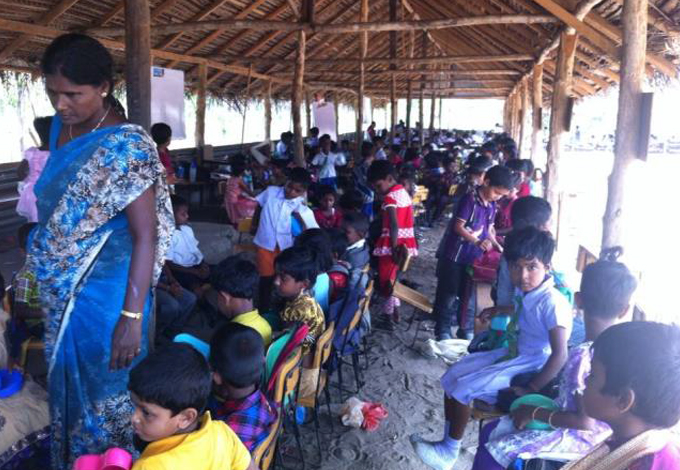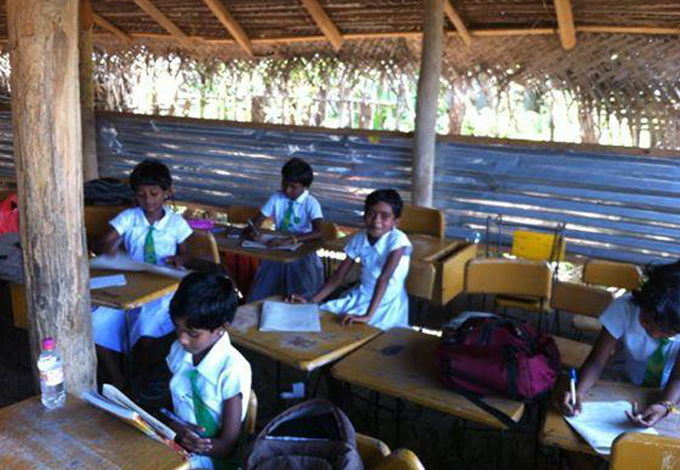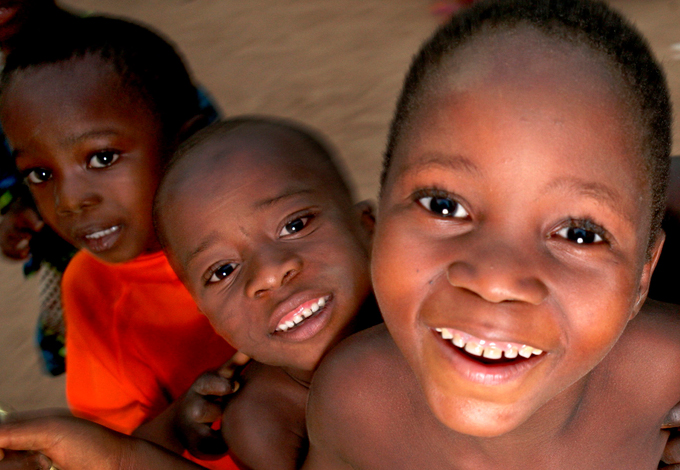In northern Sri Lanka, communities are still recuperating from the civil war that ended in 2009. This war damaged infrastructure and community life and undermined previous investment in schools across the country. While the current government has a strong focus on education and policies in place to modernize and improve the national education system, in practice many communities still lack adequate school buildings and properly trained teachers. Without these, the impact of the war continues to affect children.
This project will work in Anuradhapura, a district in northern Sri Lanka, to improve primary school enrolment, retention and completion. By constructing a new primary school with 2 new buildings, improving access to water and sanitation and delivering a range of teacher training and school management initiatives, this project aims to improve the education opportunities for an estimated 413 boys and girls in Anuradhapura.
Sri Lanka's 25 year civil conflict between government forces and Tamil Tiger rebels resulted in over 70,000 deaths and ended in 2009 when the government seized control of the last area held by the rebels.
Sri Lanka's economy has grown substantially over the past couple of years. The country is on track to achieve most of the Millennium Development Goals. Sri Lanka's main exports are clothing and textiles, tea, gems, rubber, and coconuts. Major religions are Buddhism, Hinduism, Islam and Christianity and the major languages spoken are Sinhala, Tamil and English. Sri Lanka is prone to heavy rain, hail and winds.
This project is in an area of the country where families depend on rice cultivation. Families have low incomes and during the busy harvest periods children are expected to work in the field and at home to help harvest the rice. These communities were particularly affected by the years of conflict and abandoned tanks still litter the district.
Almost thirty years of violent conflict, isolation and deprivation in the Northern and Eastern provinces of Sri Lanka has left huge developmental challenges in its wake. Over this time nearly 300,000 people were internally displaced, including 45% of children in three out of the five northern districts. The loss of livelihoods and destruction of infrastructure have left many families struggling to rebuild their lives, on top of which, the depleted capacity of the civil administration has reduced the efficiency and effectiveness of state institutions to deliver services to meet the basic needs of the population.
Since 2009, a number of schools have re-opened but the persistent lack of adequate facilities means teachers continue to face many difficulties in engaging children in quality education. The chances these children have of completing their education and lifting themselves out of poverty is almost non-existent. The protracted conflict has also had specific harmful effects on children. In addition to the disruption to education, forced child conscription, deaths or disappearances of parents, and the enduring psychological trauma of violence mean that children often bear the brunt of the effects of conflict long after it has ended.
Our project school, Anu/Aliwanguwa MV, is situated at the boundary of the Eastern province, 130km away from the Anuradhapura district centre. The current primary part of the school is inadequate in both structure and staffing and the Ministry of Education has decided to close it step by step from 2016 onwards. The next nearest primary school is 18km away from the project school.
The local community, parents and teachers have worked with Plan to propose a solution to this issue. Plan have been working in Anuradhapura district since 1999 which, with our strategic focus on Education in Sri Lanka, means that we are well positioned to help communities identify problems and negotiate solutions with local and national government. The provincial council has agreed to allocate 2 acres of land by the secondary school to be used for a new Primary School. Plan and the local community have worked with the Ministry of Education to secure a commitment to provide the teachers and cover related costs for the Primary School. With funding from Study Group, the plans to develop a new primary school and address this situation can go ahead.
The overall aim of the project is to contribute to increased primary school enrolments, retention and completion of the compulsory basic education cycle in Anuradhapura District. Specifically, the project aims to achieve increased access and improved retention in primary education for at least 413 primary school aged boys and girls currently attending Anu/Aliwanguwa MV school by the end of the project.
Plan Sri Lanka will operate this project in conjunction with the school and the local community. The local community has already committed to provide labour for some of the construction elements of the project and to maintain the buildings and the environment around them. Parents and teachers have committed to taking part in the training to improve the quality of teaching and learning within the school.
In order to help children get into and stay in education, the project will take a holistic approach and look at both the physical infrastructure and teaching quality aspects of the school. Parental involvement will also form part of many of the activities, as this is crucial to the sustainability of the school management.
The main activities of the project will include:



Vehari Project

Aceh Project

Codo Nova Project

Liu Shu Project

Zounzounkanme

Dosso & Tillaberi

School Project

Van Han Commune